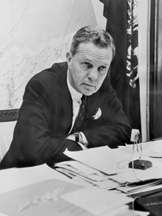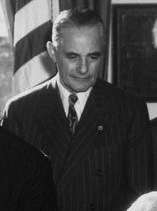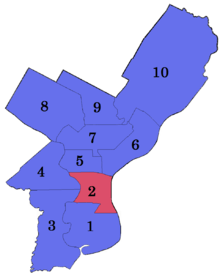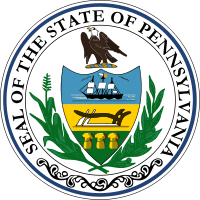Philadelphia municipal election, 1951
Philadelphia's municipal election of November 6, 1951 was the first held under the city's new charter, which had been approved by the voters the previous April. The positions contested included those of mayor, district attorney, all seventeen city council seats, among other offices. There was also a referendum on whether to consolidate the city and county governments. Citywide, the Democrats took majorities of over 100,000 votes, breaking a 67-year Republican hold on city government. Joseph S. Clark, Jr. and Richardson Dilworth, two of the main movers for the charter reform, were elected mayor and district attorney, respectively. The Democrats also took fourteen of seventeen city council seats, and city-county consolidation passed by a wide margin. The election marked the beginning of Democratic dominance of Philadelphia city politics, which continues today.
Mayor

The incumbent Republican mayor, Bernard Samuel, did not run for re-election, leaving an open seat to be contested by the Republican nominee, Daniel A. Poling, and the Democrat, Joseph S. Clark, Jr. Clark was a lawyer and United States Army officer who had served in World War II. Raised in a Republican family, he switched his party affiliation to the Democrats in 1928.[1] After several unsuccessful attempts at public office in Philadelphia, he served as a Deputy Attorney General of Pennsylvania. Clark was known as a reformer, having been elected city controller two years earlier in 1949 on a platform of cleaning up corruption in the city.[1] In those two years, Clark probed various inefficiencies, graft, and theft in the Samuel administration and reported his findings to the voters.[2] Many of those accused of crimes were convicted, and nine committed suicide.[1] Clark continued his push for reform by urging adoption of a new city charter, which was approved by referendum in April 1951.[3] He campaigned for mayor with the promise of a "clean sweep of City Hall".[4]
The Republican nominee, Poling was a Baptist preacher, which GOP leaders hoped would help deflect the corruption charges leveled against the machine.[1] Poling had worked for various charitable organizations and managed the Christian Herald.[5] His son, Clark V. Poling, was one of the Four Chaplains lost aboard the SS Dorchester in World War II, and Poling served as pastor at the chapel erected in their memory.[6]
The election was a landslide for Clark, as he won by more than 120,000 votes.[7] With 58% of the vote, the Democrats had gained nearly 215,000 votes from the last election, in which they had been defeated. As the vote tally became apparent, he told reporters that it was a "great victory for the thinking people of Philadelphia and it ends a long hard fight."[7]
| Party | Candidate | Votes | % | |
|---|---|---|---|---|
| Democratic | Joseph S. Clark, Jr. | 448,983 | 58.06 | |
| Republican | Daniel A. Poling | 324,283 | 41.94 | |
District Attorney

As in the mayor's race, the contest for district attorney pitted a Democratic reformer, Richardson Dilworth, against a representative of the Republican machine, Michael A. Foley. Dilworth, like Clark, was a former Republican who had been advocating reform for several years. He had run for mayor unsuccessfully in 1947, with Clark as his campaign manager. In 1949, he was elected City Treasurer. Democratic party leaders had intended Dilworth to be their candidate for mayor again in 1951, but when Clark announced his candidacy, Dilworth agreed to run for district attorney instead.[1] Foley, a local attorney, had no success against the Democratic wave. Dilworth won by almost as large a margin as his running mate, taking just shy of 58% of the vote. He told reporters that the victory had a "sobering effect," and that "the bigger the victory, the bigger the responsibility."[7]
| Party | Candidate | Votes | % | |
|---|---|---|---|---|
| Democratic | Richardson Dilworth | 446,841 | 57.94 | |
| Republican | Michael A. Foley | 324,433 | 42.06 | |
City Council
Under the new charter, Philadelphians elected a seventeen-member city council in 1951, with ten members representing districts of the city, and the remaining seven being elected at-large. For the at-large seats, each political party could nominate five candidates, and voters could only vote for five, with the result being that the majority party could only take five of the seven seats, leaving two for the minority party. The Democrats' citywide triumph continued into the city council races, as they took nine of ten districts and five of seven at-large seats.[9]
Constance Dallas, the first woman to win election to City Council, was elected in a close vote in the 8th district (covering Chestnut Hill, Germantown, and Roxborough) over incumbent councilman Robert S. Hamilton. In the 1st district, which took in South Philadelphia, attorney Thomas I. Guerin defeated Dominic J. Colubiale. In the 2nd, the Republicans' lone district victory came as electrical equipment salesman William M. Phillips bested Louis Vignola, a labor union official. In the 3rd district, made up of the southern half of West Philadelphia, incumbent Harry Norwitch defeated another incumbent from the old city council, George Maxman, who had held office since 1936. In the 4th, which covered the northern half of West Philadelphia, state representative Samuel Rose defeated incumbent James G. Clark.[9]
In the city's 5th district in North Philadelphia, another incumbent, Eugene J. Sullivan, was defeated by Raymond Pace Alexander, a local attorney and civil rights leader. In the 6th district, covering Kensington and Frankford, plumbers' union official Michael J. Towey won over William J. Glowacz. In the 7th, James Hugh Joseph Tate defeated Joseph A. Ferko, a local Mummers string band leader. Insurance broker Charles M. Finley defeated incumbent councilman William A. Kelley in the 9th district, which covered Oak Lane, Olney, and Logan. In Northeast Philadelphia's 10th district, incumbent Clarence K. Crossan, who had held office since 1925, went down to defeat against real estate broker John F. Byrne, Sr.[9]
In the at large races, the all five Democrats were elected, including city party chairman James A. Finnegan, former registration commissioner Victor E. Moore, Charter Commission secretary Lewis M. Stevens, attorney (and future district attorney of Philadelphia) Victor H. Blanc, and magistrate Paul D'Ortona. The Republican slate ran more than 100,000 votes behind the Democrats, with incumbent councilman Louis Schwartz and state senator John W. Lord, Jr. narrowly edging out assistant district attorney John B. Backhus, labor leader Colbert C. McClain, and clergyman Irwin W. Underhill for the two minority party slots on the council.[9]

| Party | Candidate | Votes | % | |
|---|---|---|---|---|
| Democratic | Victor E. Moore | 441,263 | 11.58 | |
| Democratic | Lewis M. Stevens | 440,945 | 11.57 | |
| Democratic | Victor H. Blanc | 439,942 | 11.55 | |
| Democratic | James A. Finnegan | 439,820 | 11.55 | |
| Democratic | Paul D'Ortona | 439,534 | 11.54 | |
| Republican | Louis Schwartz | 322,224 | 8.46 | |
| Republican | John W. Lord, Jr. | 321,984 | 8.45 | |
| Republican | John B. Backhus | 321,540 | 8.44 | |
| Republican | Irwin W. Underhill | 321,434 | 8.44 | |
| Republican | Colbert C. McClain | 320,922 | 8.42 | |
| Party | Candidate | Votes | % | |
|---|---|---|---|---|
| Democratic | Thomas I. Guerin | 45,859 | 57.78 | |
| Republican | Dominic J. Colubiale | 33,511 | 42.22 | |
| Party | Candidate | Votes | % | |
|---|---|---|---|---|
| Republican | William M. Phillips | 47,814 | 58.60 | |
| Democratic | Louis Vignola | 33,783 | 41.40 | |
| Party | Candidate | Votes | % | |
|---|---|---|---|---|
| Democratic | Harry Norwitch | 50,286 | 61.77 | |
| Republican | George Maxman | 31,128 | 38.23 | |
| Party | Candidate | Votes | % | |
|---|---|---|---|---|
| Democratic | Samuel Rose | 42,797 | 62.00 | |
| Republican | James G. Clark | 26,225 | 38.00 | |
| Party | Candidate | Votes | % | |
|---|---|---|---|---|
| Democratic | Raymond Pace Alexander | 37,918 | 58.10 | |
| Republican | Eugene J. Sullivan | 27,340 | 41.90 | |
| Party | Candidate | Votes | % | |
|---|---|---|---|---|
| Democratic | Michael J. Towey | 47,072 | 55.05 | |
| Republican | William J. Glowacz | 38,442 | 44.95 | |
| Party | Candidate | Votes | % | |
|---|---|---|---|---|
| Democratic | James Hugh Joseph Tate | 48,139 | 61.98 | |
| Republican | Joseph A. Ferko | 29,529 | 38.02 | |
| Party | Candidate | Votes | % | |
|---|---|---|---|---|
| Democratic | Constance Dallas | 33,751 | 54.11 | |
| Republican | Robert S. Hamilton | 28,623 | 45.89 | |
| Party | Candidate | Votes | % | |
|---|---|---|---|---|
| Democratic | Charles M. Finley | 49,278 | 63.38 | |
| Republican | William A. Kelley | 28,476 | 36.62 | |
| Party | Candidate | Votes | % | |
|---|---|---|---|---|
| Democratic | John F. Byrne, Sr. | 50,083 | 60.36 | |
| Republican | Clarence K. Crossan | 32,890 | 39.64 | |
Other offices, referendum, and aftermath
The Democrats' success continued down the ballot. They elected a county sheriff, William M. Lennox; clerk of courts, Joseph A. Scanlon; and recorder of deeds, Marshall L. Shepard. In the race for county commissioners, each party nominates two candidates and the top three are elected: here, too, the Democrats triumphed, electing both Maurice C. Osser and Thomas P. McHenry. The Republican spot on the county commission went to Walter I. Davidson. The Democrats also took eight of the fourteen magisterial district judge positions (a local court, the duties of which are now performed by the Philadelphia Municipal Court).[9]
A statewide referendum on the ballot that day continued the work begun by the new city charter in asking voters to consolidate the city and county governments in Philadelphia. In 1854, all of the municipalities in Philadelphia County had been consolidated into one city, but many county offices still existed, duplicating the efforts of city officials. Merging the city and county governments had been defeated in a 1937 referendum, but in 1951 the question was overwhelmingly approved.[11]
The 1951 election was the final blow to Philadelphia's once-dominant Republican machine. Since that time, the Democratic party has dominated the city's politics, with no other party electing a mayor or a majority of the city council in the intervening years.[12]
See also
References
- 1 2 3 4 5 Neal 1990.
- ↑ Clark 1991, p. 94.
- ↑ Miller 1951a.
- ↑ Daily Times 1951.
- ↑ Associated Press 1968.
- ↑ Feller 2007, p. 677.
- 1 2 3 Miller 1951b.
- 1 2 3 Bulletin Almanac 1952, p. 33.
- 1 2 3 4 5 Inquirer 1951a.
- 1 2 3 4 5 6 7 8 9 10 Bulletin Almanac 1952, p. 34.
- ↑ Inquirer 1951b.
- ↑ Leib 2014.
Sources
Books
- Bulletin Almanac 1952. Philadelphia, Pennsylvania: The Philadelphia Bulletin. 1952. OCLC 8641470.
- Feller, Wende Vyborney (2007). "Poling, Daniel Alfred (1884-1968)". In Shearer, Benjamin F. Home Front Heroes: A Biographical Dictionary of Americans During Wartime. 3. Westport, Connecticut: Greenwood Press. pp. 676–677. ISBN 0-313-33423-4.
Journal
- Clark, George R. (March 1991). "Joseph Sill Clark (October 21, 1901 – January 12, 1990)". Proceedings of the American Philosophical Society. 135 (1): 92–97. JSTOR 987153.
Newspapers
- "Democrats End 67-Year GOP Rule in Philadelphia". Delaware County Daily Times. November 7, 1951.
- "Woman Elected to First Seat in City Council". Philadelphia Inquirer. November 7, 1951.
- "City and County Merger Believed OK'd by Voters". Philadelphia Inquirer. November 7, 1951.
- Associated Press (February 8, 1968). "Dr. Poling Dies at 83; Clergyman". Delaware County Daily Times.
- Leib, Bryan E.K. (November 26, 2014). "Philadelphia's Democratic Party Machine and Primer for 2015 Mayors Race". The Vanguard. Philadelphia Community College.
- Miller, Joseph H. (April 18, 1951a). "Independents Play Decisive Role in Victory". Philadelphia Inquirer.
- Miller, Joseph H. (November 7, 1951b). "Democrats win by 122,000". Philadelphia Inquirer.
- Neal, Steve (January 15, 1990). "Political Giant Joseph Clark Dead At 88". Philadelphia Inquirer.
